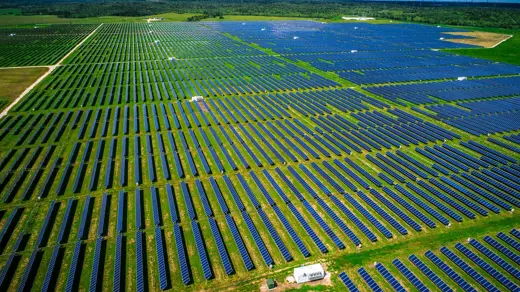There was also agreement among leading financial organisations in the private sector – organisations that between them control two-fifths of the world’s financial assets – to invest in ‘clean technology’ and direct finance away from fossil fuel-burning industries.
While there was clearly a lot of discussions and agreement on where investment flows need to go over the two-week summit, what was not discussed, or at least not widely, was where some of that capital comes from or what happens to it when it gets there.
Environmental crime is estimated to be among the most profitable proceeds-generating crimes in the world, generating around $110 to $281 billion in criminal gains each year and includes a wide range of activities from illegal extraction, to trade of forestry and minerals, to illegal land clearance and waste trafficking.
Participants involved in these crimes vary from large, established crime groups to multinational companies and individuals. These participants however, rely on the financial and non-financial sector to launder the proceeds of environmental crime.
To encourage closer examination of investment flows withing the financial sector, the Financial Action Task Force (FATF) published a report recently entitled ‘Money Laundering from Environmental Crime’. It highlights that many countries have not considered environmental crime in their latest national or sectoral anti money laundering (AML) risk assessments, and as a result many regulated institutions and firms are often unaware of being exposed to this type of financial crime.
The report states that “even countries with limited domestic natural resources should consider the risk that criminals could use their financial and non-financial sector (e.g., lawyers, TCSPs) to facilitate laundering from such crimes. This is particularly relevant for financial and company service hubs”.
Areas that are particularly rife are trade-based transactions with shell and front companies being used to disguise the proceeds of environmental crime, with the repercussions of those transactions often far greater than most realise. Environmental crime feeds into other crimes such as corruption, human security, drug trafficking and human rights violations, all of which should already form part of AML assessments or due diligence processes, but often aren’t fully considered, particularly environmental crime risk and associated implications.
To bring about change, it is vital that environmental crime is considered more closely as part of source of funds and source of wealth assessments in KYC and due diligence to help further facilitate the focus on protecting our environment.
The financial services industry clearly has a significant role to play in all this, not just in helping to drive capital towards Environmental, Social and Governance (ESG) initiatives, but acting as a gatekeeper in protecting the environment by looking at and looking through ESG investment flows, from where funding comes from to what happens to it when it lands.
Apex Group provides managed AML & Due Diligence services, along with a range of ESG compliance and strategic advisory services and solutions, including ESG Invest Check. Get in touch with our expert team to find out how we can help you.






